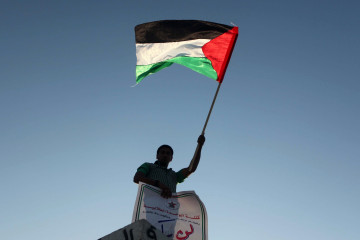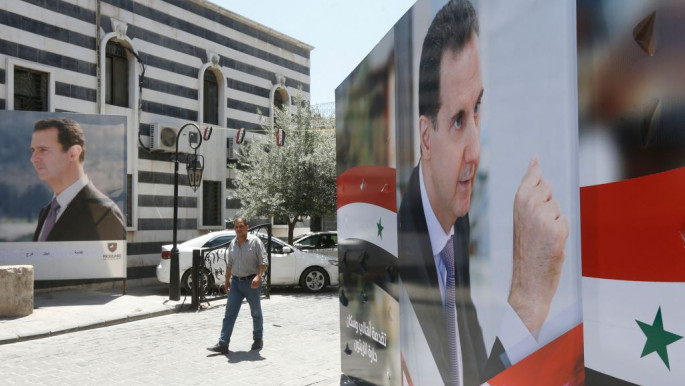

The last time Osama Satiti heard from his uncle was in 2015. His uncle, Mohammed Diab, was a Palestinian refugee and resident of the Yarmouk camp on the outskirts of Damascus.
Yarmouk, once the largest Palestinian refugee camp in Syria, became the site of intense fighting and a punishing siege during Syria’s civil war.
As the fighting intensified, his family in Gaza urged him to leave Syria and seek refuge in another country. Mohammed refused, seeing the increased bombings by Russian planes as a sign that stability was on the horizon.
Then one day, Mohammed disappeared.
"Almost 1,800 Palestinians have been arrested by Syrian authorities – most of whose fates are unknown"
At first, it was as if he had simply vanished. No news reached the family of his whereabouts. It was not until 2019 – four years after his disappearance – that they were able to even confirm that he was alive, detained in one of Assad’s prisons.
The relief Osama and his family felt at the news that their uncle was alive was short-lived. They soon learned that Mohammed had been subject to torture by regime forces.
“Assad’s forces tortured Mohammed in different ways, physically and psychologically, and there was no clear charge against him which would enable us to hire a lawyer to free him from the regime’s prisons,” Satiti said.
At the same time, authorities in Syria stepped up their harassment of Mohammed’s family still in Syria. They were told they would be arrested or killed if they did not publicly declare their allegiance to the Assad regime.
Soon, they had to leave Syria for their own safety, without ever learning of Mohammed's fate.
Mohammed is one of almost 1,800 Palestinians arrested by Syrian authorities – most of whose fates are similarly unknown, Mahmoud Zaghmour, a journalist and member of the UK-based Action Group for Palestinians of Syria (AGPS) told The New Arab.
While the regime “did not distinguish between Syrian citizens and Palestinian refugees in terms of the policy of collective punishment” in its brutal practices, Zaghmour said, Palestinians in Syria suffered untold atrocities during the country’s civil war.
The regime’s siege of the Yarmouk refugee camp was a “horror story of war crimes, starvation and death,” according to Amnesty International.
The Tadamon Massacre, the brutal execution of up to 280 civilians by regime soldiers, saw Palestinian residents of Yarmouk executed alongside Syrians.
“There are thousands of Palestinians displaced from their homes inside Syria and more than two hundred thousand displaced outside Syria. Palestinian refugees have paid a great price during the past ten years,” Zaghmour, said.
The detention of Palestinians in Syrian prisons has continued despite a restoration of relations between Hamas and Syria in October 2021 – ten years after siding with rebels against the regime.
|
|
Bashar al-Assad and a return to the 'resistance'
When the Arab Spring broke out in 2011 and dictatorships from Libya to Jordan faced protests, Bashar al-Assad did not seem to be worried. Syria would not face protests, one publication opined at the time, because its leadership’s foreign policy was exactly in line with the wants of its people.
Syria’s leadership had long styled itself as Israel’s biggest enemy and Palestine’s most faithful friend. As an old saying in Syria used to go: “The Syrian government is great – to everybody except Syrians”.
A core part of Bashar al-Assad and his late father Hafez’s brand was their pivotal role in the “resistance” against Palestine’s occupation. Syria fought directly against Israel, and the Palestinian Liberation Organisation (PLO) used the country as a base of operations at various points.
Later, once Egypt, and then later Jordan, made nice with Israel, Syria doubled down on this messaging: it was the last remaining bastion of resistance against Israel.
"There are thousands of Palestinians displaced from their homes inside Syria and more than two hundred thousand displaced outside Syria. Palestinian refugees have paid a great price during the past ten years"
Palestine’s resistance, however, decided they could not back the Syrian regime’s crackdown on its own protesters and Hamas formally broke off relations in 2012.
Hamas’s decision to restore relations with Damascus is not significant to Syria in terms of trade or political support. The faction, which controls the small, besieged Gaza Strip, does not have much to offer the regime in terms of material support.
Instead, it gives the regime’s rhetoric about being a part of the “resistance” weight against Western and particularly Israeli foreign policy.
Speaking at a meeting with Assad in Damascus in October, the head of Hamas’ political bureau Khalil al-Hayya, said that “the meeting is a natural response of the resistance from the heart of Syria”.
Al-Hayya added that he “assured President Bashar al-Assad that we are with a united Syria against being targeted by Zionism-American foreign aggression”.
For Hamas, the decision to restore relations with Damascus holds more strategic weight. Hamas depends on Iran for funding and weaponry, and its decision to cut off relations with Syria in 2011 produced strains in its relations with Iran.
The group’s detente with Syria has brought it closer into orbit with Lebanon’s Hezbollah and Iran, two vital regional allies.
|
|
Can Hamas save Palestinian detainees?
The restoration of relations between Syria and Hamas had given some families of Palestinian detainees in Syria renewed hope about the fate of their loved ones.
Mohib al-Nawati, a Palestinian journalist and father of six, was arrested in 2017 in Syria while conducting research for a book about Hamas.
His brother, Mudhar al-Nawati, told TNA that they had not been able to obtain any information about Mohib’s whereabouts for the past five years, save a confirmation from an unofficial source that he had been arrested.
Al-Nawati said despite his entreaties to Palestinian authorities and other international bodies, he has been unable to secure the release of his brother.
"The Tadamon Massacre, the brutal execution of up to 280 civilians by regime soldiers, saw Palestinian residents of Yarmouk executed alongside Syrians"
“We appealed to all Palestinian factions, including Fatah and Hamas, and all international institutions that care about journalists to release my brother or inform us of his whereabouts (…) Unfortunately, we never received a response from the Syrian authorities,” al-Nawati said.
An official source in Hamas told TNA under the condition of anonymity that they were in regular contact with Syrian officials to negotiate with them to find out the fate of Palestinian detainees.
“Unfortunately, despite many promises, the Syrian regime still refuses to take our demands seriously,” the source said at the time of normalisation.
Despite the release of political detainees being a top demand of states and human rights organisations, Damascus has not shown any willingness to release the 136,000 people in its prisons.
The regime has on occasion issued amnesties but these have been criticised by rights monitors for being extremely limited in scope. The last amnesty released just over 600 detainees, or about 0.5 percent of those currently in regime prisons.
According to Khalil Shaheen, a political analyst from the West Bank, it is unlikely that Hamas will be able to persuade the regime to release Palestinians from prison as it views Palestinians in Syria as Syrian citizens.
“With regard to the Syrian regime, there is no difference between a Syrian and a Palestinian if they are opposed to the regime (…) both sides are subjected to the same injustice, the same torture, and the same systematic killing,” Shaheen told TNA.
In the meantime, the families of detainees are forced to wait indefinitely under the crushing weight of silence, reeling from the loss of their loved ones.
“Because of their grief over their son, my uncle and his wife died in one of the refugee camps in Lebanon (…) his four brothers immigrated to Europe in an attempt to save what was left of their families,” Satiti said.
William Christou is The New Arab's Levantine correspondent, covering the politics of the Levant and the Mediterranean.
Follow him on Twitter: @will_christou
Sally Ibrahim is a Palestinian reporter with The New Arab based in the Gaza Strip.






 Follow the Middle East's top stories in English at The New Arab on Google News
Follow the Middle East's top stories in English at The New Arab on Google News


